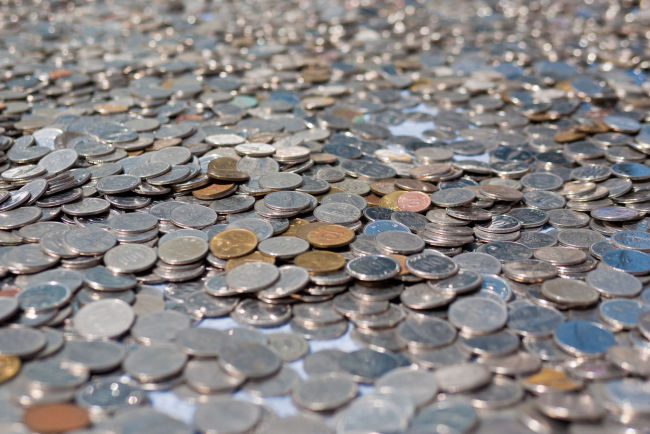[Weekender] Korea going coinless by 2020
Central bank pushes scheme to cut costs and improve transparency
By Korea HeraldPublished : April 15, 2016 - 17:28
Korea is officially going cashless by dumping coins first.
In the country that boasts high smartphone adoption and credit card ownership, the way people pay for everything is changing, with more digital transactions than ever before.
To spur the trend, the Bank of Korea is seeking a digital way to replace coins for transactions with its aim to make Korea a “coinless society” by 2020.
“The most important goals are resolving inconvenience that consumers and shops feel while carrying and storing coins and reducing the cost of minting coins,” said Kim Jung-hyeok, head of the Electronic Banking team at the BOK and head of the project.
In the country that boasts high smartphone adoption and credit card ownership, the way people pay for everything is changing, with more digital transactions than ever before.
To spur the trend, the Bank of Korea is seeking a digital way to replace coins for transactions with its aim to make Korea a “coinless society” by 2020.
“The most important goals are resolving inconvenience that consumers and shops feel while carrying and storing coins and reducing the cost of minting coins,” said Kim Jung-hyeok, head of the Electronic Banking team at the BOK and head of the project.

The central bank already has started to phase out the coins by cutting the volume of coin production from 137.8 billion won ($120.2 million) in 2005 to 103.2 billion won last year.
But it still spends more than 50 billion won a year minting coins.
Under the plan, people who pay cash at retailers such as convenience stores and discount chains will receive change not in coins, but in noncash payment instruments like transportation cards, credit cards or to mobile bank account.
“Consumers show different preferences for the options to transfer the coin change into their cards, but we will begin with public transportation cards first. By next year, the system is expected to run after completing a model development and pilot test this year,” Kim said.
The scheme aims to gradually scrap cash altogether, but not entirely make it extinct, he added.
For instance, if a consumer gives 10,000 won for a 8,500-won item, vendors would directly deposit 500 won to a card and give back 1,000 won in cash, or the entire 1,500 won to an account of their choice.
Experts said that the central bank-driven initiative is unlikely to have a major impact on the country’s society and economy.
“While the demise of cash needs a social consensus, the coinless society is more like a technical issue in which the success of the scheme depends on the realization of infrastructure,” said Kang Im-ho, a professor at Hanyang University and a member of advisory panel for the BOK’s plan.
“It’s a coordination game among the government, financial firms, retailers and consumers.”
Kang said that the country’s high credit card ownership -- citizens own an average of 1.9 credit cards -- provides conditions favorable to spur cashless payments.
Then, why not go completely cashless from the outset?
Unlike European countries such as Denmark, Sweden and Norway -- global leaders of the electronic money trend -- where ordinary consumers rarely use high-value notes, Korea still has comparably high demand for cash.
Statistics from the Bank of Korea show that cash makes up the second-largest share of consumer transaction activity at 36 percent in 2015, following credit cards at 39.7 percent. Scandinavians rely on cash for less than 6 percent of all payments made.
“In some Asian countries including Korea and China, people give large sums of cash as gifts at weddings or funerals. Such a cultural backdrop shows that Korea needs a different approach toward a cashless economy,” said Moon jong-jin, an economy professor at Myongji University.
With a rapidly aging population, the demographic composition is drawing concern about how well elderly people will adopt the new electronic payment options.
“I don’t think it’s possible to establish an absolute cash-free world here. It will be better to give seniors options like we did for smartphones. Not everyone uses smartphone, but it’s their choice,” Moon said.
To bring the underground economy out in the open, however, ditching notes and coins is a crucial task for Korean society.
“It is important for countries like Korea which suffer a severe polarization of wealth due to the shadow economy to pursue more transparency,” he said.
By Park Han-na (hnpark@heraldcorp.com)
-
Articles by Korea Herald



![[Herald Interview] 'Amid aging population, Korea to invite more young professionals from overseas'](http://res.heraldm.com/phpwas/restmb_idxmake.php?idx=644&simg=/content/image/2024/04/24/20240424050844_0.jpg&u=20240424200058)














![[KH Explains] Korean shipbuilding stocks rally: Real growth or bubble?](http://res.heraldm.com/phpwas/restmb_idxmake.php?idx=652&simg=/content/image/2024/04/25/20240425050656_0.jpg&u=)

